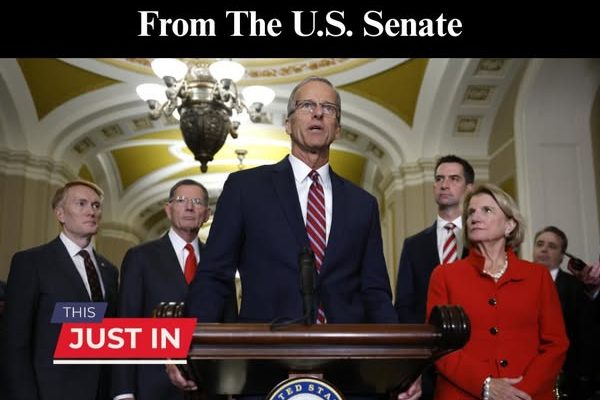Some Republican senators openly complained about President Donald Trump’s tariff regimen implemented on his self-proclaimed “Liberation Day” Tuesday without giving the head of the Executive Branch any leeway — or time — to see if they’ll be successful.
“In the long run, we’re all dead,” Sen. John Kennedy (R-La) quipped to CNN’s chief congressional correspondent Manu Raju for The Lead With Jake Tapper. He added: “Short run matters too. Nobody knows what the impact of these tariffs is going to be on the economy.”
Sen. Thom Tillis (R-NC), added: “Anyone who says there may be a little bit of pain before we get things right, they didn’t talk about farmers who are one crop away from bankruptcy.”
Later, Kennedy told Newsmax TV’s Rob Schmitt: “We’re in uncharted waters and we don’t know. And anybody who tries to tell you that they know what the short-term impact is going to be is just lying. Either that or they’re selling deep stupid.”
In his speech from the White House on Wednesday, Trump declared that April 2, 2025, “will forever be remembered as the day American industry was reborn, the day America’s destiny was reclaimed, and the day that we began to make America wealthy again.” He went on to say that he would sign an executive order placing “reciprocal tariffs on countries throughout the world.”
Trump noted in an executive order declaring the country’s chronic trade deficits to be a national emergency:
On January 20, 2025, I signed the America First Trade Policy Presidential Memorandum directing my Administration to investigate the causes of our country’s large and persistent annual trade deficits in goods, including the economic and national security implications and risks resulting from such deficits, and to undertake a review of, and identify, any unfair trade practices by other countries.
On February 13, 2025, I signed a Presidential Memorandum entitled “Reciprocal Trade and Tariffs,” that directed further review of our trading partners’ non-reciprocal trading practices, and noted the relationship between non-reciprocal practices and the trade deficit. On April 1, 2025, I received the final results of those investigations, and I am taking action today based on those results.
“Large and persistent annual U.S. goods trade deficits have led to the hollowing out of our manufacturing base; inhibited our ability to scale advanced domestic manufacturing capacity; undermined critical supply chains; and rendered our defense-industrial base dependent on foreign adversaries,” the order continued.
“Large and persistent annual U.S. goods trade deficits are caused in substantial part by a lack of reciprocity in our bilateral trade relationships. This situation is evidenced by disparate tariff rates and non-tariff barriers that make it harder for U.S. manufacturers to sell their products in foreign markets,” it added.
“It is also evidenced by the economic policies of key U.S. trading partners insofar as they suppress domestic wages and consumption, and thereby demand for U.S. exports, while artificially increasing the competitiveness of their goods in global markets. These conditions have given rise to the national emergency that this order is intended to abate and resolve,” the order states.
The directive also noted that for decades beginning in 1934, the U.S. signed scores of reciprocal trade agreements aimed at reducing tariffs. Between the end of World War II and 1994, “participating countries engaged in eight rounds of negotiation, which resulted in the General Agreements on Tariffs and Trade (GATT) and seven subsequent tariff reduction rounds,” says the order.
“However, despite a commitment to the principle of reciprocity, the trading relationship between the United States and its trading partners has become highly unbalanced, particularly in recent years” because it was based on a trio of incorrect assumptions, which Trump outlined in his directive.
The goal of his tariffs is to re-shore American manufacturing, which fell to 17.4 percent of the global total in 2023, down from a peak of 28.4 percent in 2001, according to the order.



